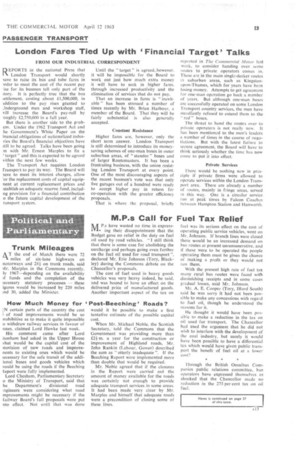London Fares Tied Up with 'Financial Target' Talks
Page 15

If you've noticed an error in this article please click here to report it so we can fix it.
FROM OUR INDUSTRIAL CORRESPONDENT
REPORTS in the national Press that I% London Transport would shortly lave to raise its bus and tube fares in )rder to meet the cost of the recent pay ise for its busmen tell only part of the ;tory. It is perfectly true that the bus ;ettlement, costing about £1,500,000, in iddition to the pay rises granted to Jnderground men and Workshop staff, vill increase the Board's pay-roll by 'oughly £2.750,000 in a full year.
But there is another side to the p-obem. Under the 1962 Transport Act and he Government's White Paper on the inancial obligations of nationalized indusries the Board's financial objectives have ;till to be agreed. Talks have been going m with Mr. Ernest Marples to fix a ' target " and this is expected to be agreed vithin the next few weeks.
The Transport Act requires London Transport to pay its way. The Board will lave to meet its interest charges, allow 'or the replacement costs of capital equipment at current replacement prices and .stablish an adequate reserve fund, includng provision for a financial contribution o the future capital development of the ransport system. Until the " target " is agreed, however, it will be impossible for the Board to work out just how much extra money it will have to seek in higher fares. through increased productivity and the elimination of services that do not pay.
That an increase in fares is " inevitable' has been stressed a number of times recently by Mr. Brian Harbour, a member of the Board. That they will be fairly substantial is also generally accepted.
Constant Resistance Higher fares are, however, only the short term answer. London Transport is still determined to introduce its moneysaving schemes of one-man buses in outer suburban areas, of "standee" buses and of larger Routemasters. It has been a frustrating business, with the union resisting London Transport at every point. One of the most discouraging aspects of the recent busmen's vote was that only five garages out of a hundred were ready to accept higher pay in return for co-operation with the greater efficiency proposals.
That is where the proposal, briefly
reported in The Commercial Motor last week, to consider handing over some routes to private operators comes in. These are in the Main single-decker routes in suburban areas, such as Kingstonupon-Thames, which for years have been losing money. Attempts to get agreement for one-man operation go back a number of years. But although one-man buses are successfully operated on some London Transport country services, the men have steadfastly refused to extend them to the " red " buses.
The threat to hand the routes over to private operators is not really new. It has been mentioned to the men's leaders a number of times in the course of negotiations. But with the latest failure to secure agreement, the Board will have to think seriously whether the time has now come to put it into effect.
Private Services There would be nothing new in principle if private 'firms were allowed to operate services within the London Transport area. There are already a number of routes, mainly in fringe areas, served in this way. One is a circular service run at peak times by Falcon Coaches between Hampton Station and Hanworth.








































































































